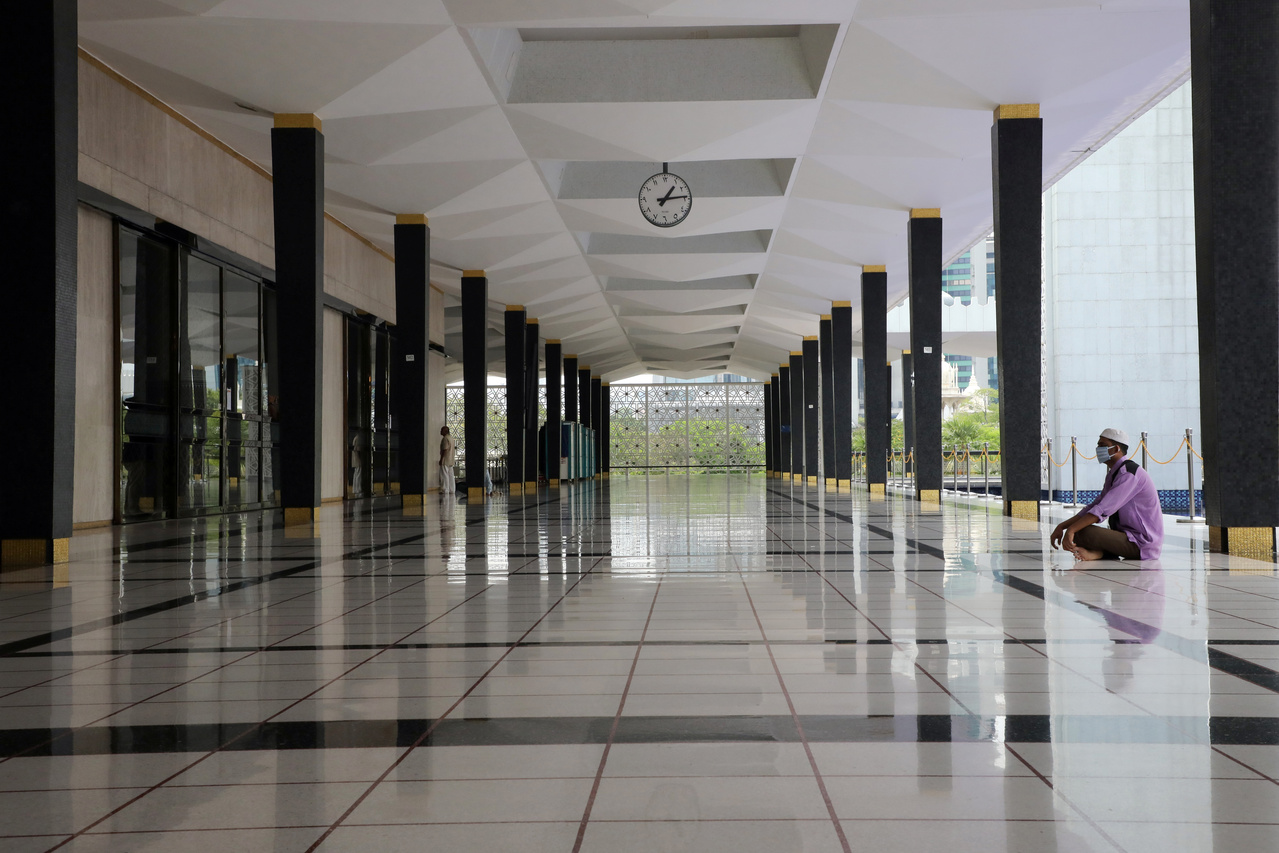Coronavirus: Malaysians take two-week lockdown on the chin even though incomes cut
Sign up now: Get insights on the biggest stories in Malaysia

A Muslim wearing a protective mask rests at National Mosque in Kuala Lumpur, Malaysia, on March 20, 2020.
PHOTO: REUTERS
KUALA LUMPUR - The closure of all non-essential commercial activities from Wednesday (March 18) until the end of the month to curb the coronavirus outbreak has hit Malaysians where it hurts the most - in their pockets.
Many who are self-employed or freelancers in the gig economy are suddenly finding their March revenues halved. While the tourism industry has already been in decline as travellers cut back on plans since the start of the year, the cancellation of all bookings during this period has forced many companies to send full-time staff on unpaid leave. The two-week Restricted Movement Order (RMO) extended to all inbound and outbound travel.
But given the alternative - an uncontrolled spread of the fatal Covid-19 disease - many are taking the blow from the RMO on the chin.
"I consider myself fortunate that I will still have a job at the end of this tunnel," said IT specialist Simon Yap, 42, after doing a final check on systems at the Kuala Lumpur hotel he will not be able to go to for two weeks. "Some poor souls under probation who haven't been confirmed had to be let go."
Government estimates up to February show that tourism has lost RM3.4 billion (S$1.1 billion), with March expected to be bleaker. This will make up the lion's share of the projected 0.8 to 1.2 per cent hit (worth up to RM17.3 billion) on the Malaysian economy due to the global pandemic.
Malaysia Airlines and Malindo Air are among carriers that are asking employees to take voluntary unpaid leave of up to three months and similar measures have been taken by those not in the tourism sector. Some of those who have taken up the offer say they are willing to do so in difficult times as they would be jobless if businesses end up folding.
Caterer Izam Shafinaz Zakaria, 41, has been affected by the cutbacks. She had two weeks of orders for an airline manufacturer's training sessions cancelled.
"I am trying not to think about it, but if this thing does not end by the end of the month, I am in trouble," she said, noting that her efforts to earn income on the side by selling kitchenware have not taken off amid the public's lack of appetite for shopping during this period.
Sports and fitness centres have also had to shut for the fortnight, reducing to zero the incomes of most trainers, who are paid by the number of classes they hold. Their financial woes are compounded by the need to maintain their physique while working out and eating at home.
Personal trainer Steph Goh, 29, has been building goodwill with clients. She holding "virtual group training" via video-conferencing app Zoom. Fortgyms, where Ms Goh conducts her classes, has also been posting home fitness routines and demonstrations on its social media.
Others in the gig economy affected include tens of thousands of drivers on e-hailing and delivery apps as well as taxi drivers. The World Bank estimates that more than a quarter of Malaysia's workforce are freelancers.
Whether or not the RMO is lifted in April, many may find their incomes impacted by Covid-19 in the long run, with most economists expecting growth for 2020 to come below the government's projected minimum of 3.2 per cent - already lower than last year's 4.3 per cent.
The Muhyiddin Yassin administration announced on Monday a stipend of RM600 monthly for up to six months for employees forced to go on no-pay leave during the RMO. The Human Resources Ministry and several lawyers have said that under labour laws, workers earning less than RM2,000 a month must be paid their full salaries despite business closures.


